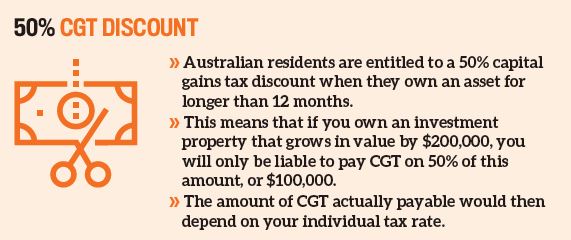What is Capital Gains Tax?
The fees paid to the government based on the profit from the selling of certain assets is defined as CGT (Capital Gains Tax). The assets commonly include stock investments or real estate property. This is an area to be mindful of when selling your home in Australia.
In Australia, assets categorized as property such as real estate or shares in companies are liable to CGT. However, this applies solely to assets already sold or ‘realized’. Unsold assets do not require CGT regardless of how long they have been held. Additionally, CGT applies to profits gained from assets held for one or more years. Otherwise known as long-term capital gains. Short-term capital gains are not taxed under CGT.
When does it apply to property sale?
When selling your home in Australia, the CGT generates when:
- Considering net capital gain as taxable income in the year of selling your home
- If the property is owned for one or more years the gain is initially discounted at 50% for single taxpayers
In Australia, the government does not charge CGT when your house or property is sold given that the home is your main residence. Aside from that, most other real estate is subject to CGT. Including holiday houses, rental properties, vacant land, and business properties.
For your home to be exempt from CGT it needs to fall into these categories:
- You are an Australian citizen
- The inhabitants of your home is yourself, your partner and other dependents during period of ownership
- The property has not been used to generate income
- It is built on a land of two hectares or less
In the event you are selling a non-principal residence property such as a rental, a capital gain tax will be calculated. To generate this you need to identify if:
- You have achieved a net capital gain in your income within the fiscal year. Thus, you will be liable for CGT
- You have sustained a net capital loss. You will be able to reduce the loss from following capital gains

What can you do to avoid or minimise CGT when selling a home?
If this was your main residence (also called ‘principal place of residence’ or ‘PPR’), and you lived in the property for more than 12 months you will be exempt from CGT in most cases.
If you have capital losses (e.g. from shares), you can offset that against the capital gains made that year (e.g. from property). More on that here (tax-loss harvesting). As always, before making decisions in this area, you should consult a tax specialist.
What is Goods and Services Tax?
GST or Goods and Services Tax is the value-added tax of 10% on most goods, services, and other items sold or consumed domestically in Australia. However, some items are free of GST such as basic food, education, and medicine.
However, goods and services tax is inapplicable to residential properties, properties that are privately owned or used for private purposes.
When does it apply to a property sale?
Goods and services tax becomes applicable to the distribution of certain types of property in the event that the distributor or vendor falls under the registration for GST purposes.
To register under GST for your property you will likely need to fall into one of these categories:
- You have or run a business on the property
- The turnover for transactions generated by your properties exceeds the standard GST threshold
- Your actions regarding the property are categorized as ‘business’. Such as purchasing land with the reason to renovate and resale.
The type of property liable to GST in this context is known as ‘ real property.’ This includes land, buildings, and interest in rights over these lands and buildings.
You are liable to pay GST if you build a new residential place, and can be eligible for GST credits in areas such as construction cost.
